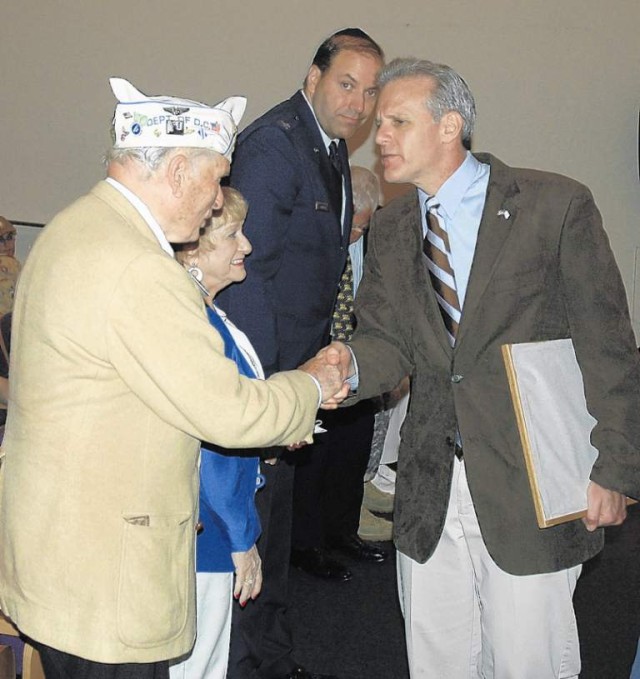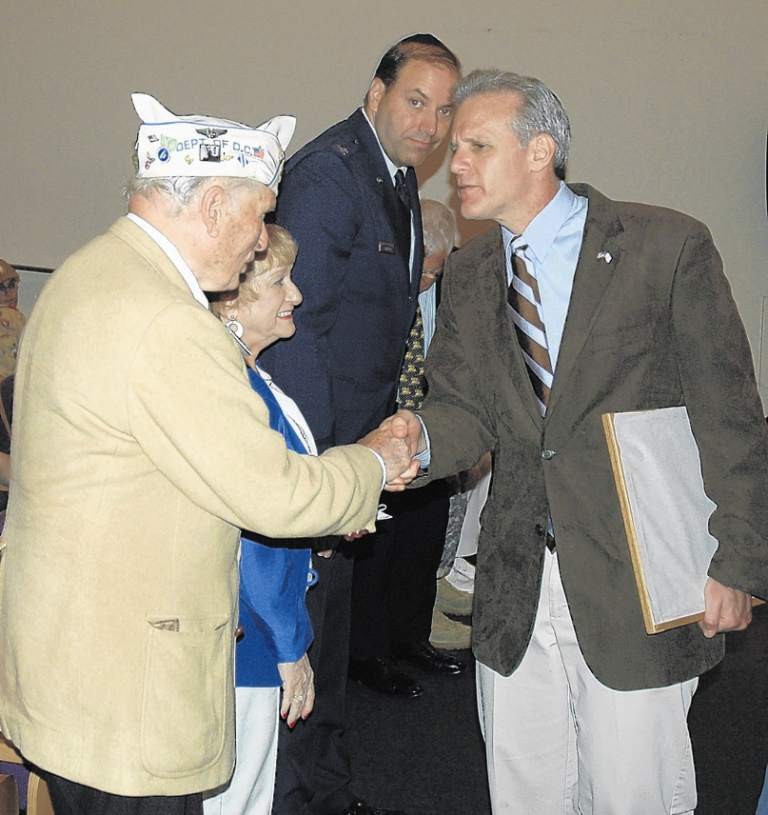
FORT BELVOIR, Va. - The Fort Belvoir Jewish Congregation was one of several co-sponsors for a ceremony Sunday marking the life and contributions of the late Maj. Gen. Orde Charles Wingate - a British Army officer and creator of special military units in Palestine during the 1930s and World War II.
Wingate died in a plane crash with several Americans while on a mission in Burma on March 24, 1944. He is buried at Arlington National Cemetery, one of only a few non-Americans to be laid to rest on the hallowed grounds, along with eight others who perished in the crash.
Sponsored annually by the Jewish War Veterans of the U.S.A. Department of Washington, D.C., this year's ceremony featured several special guests, including Michael Oren, Israeli Ambassador to the U.S.
Speaking in both Hebrew and English, Oren told the audience gathered inside the Women's National Military Memorial that Wingate was a highly religious man who became a supporter of Zionism. He also said it was Wingate's dream to lead the Jewish Army to independence.
"He saw it as his Christian duty to help the Jewish community in Palestine form a Jewish state. He trained members of the Haganah, which eventually became the Israel Defense Forces in 1948," Oren said. "Maj. Gen. Wingate is a revered figure known around the world. In Jerusalem, there are main squares and villages named after him. Israel's National Center of Physical Education and Sport, as well as a major children's orphanage, also bear his name. His legacy and what he stood for will carry on forever."
Oren was followed by Nicholas Kittrie, a professor of criminal law at Washington, D.C.'s American University. As a young man, Kittrie studied Wingate while attending school in Palestine. His dreams of meeting the man face-to-face also came true when he served with the British officer in Burma just before he died.
"I found him to be very intriguing. Not only was Wingate a great hero to British and Jewish people, but a deeply religious man," Kittrie said. "He carried a small, leather copy of the Bible wherever he went. Not many people know this, but he's also a distant cousin of Lawrence of Arabia. His death was a loss to the entire world."
Among all his accomplishments, Kittrie said Wingate is most heralded for his creation of the Chindits, a group of airborne-deep penetration troops trained to work behind enemy lines in the Far East campaigns against the Japanese during World War II.
To this day, Kittrie said many of the present counter-intelligence operations related to guerilla warfare were first initiated by Wingate. As a tribute to the man he refers to as his "personal icon," Kittrie named his oldest son, Orde, in his memory.
Though brief, retired British general John Alison also had a personal connection with Wingate. Now 98, Alison was Wingate's pilot in Burma and flew him on almost all his missions. All - except the very last one.
"I received orders telling me that I was going back to England. If not for that, I most likely would have been on that plane. We never found out what brought them down," Alison said with his voice cracking. "My knowledge of Wingate is somewhat limited because I only knew him for two months. Though, I knew he was a man who inspired others to follow him."
Alison said Wingate was also a man of eccentricities. For example, he said Wingate would wear an alarm clock around his wrist and have a raw onion on a string around his neck. While the British commander deserves the praise and recognition he receives today, Alison jokes that Wingate's personality was far more popular with American and Israeli soldiers than it was with British soldiers.
However, he agreed with Kittrie that his death was a loss felt by many countries around the globe.
"A cold chill went over my body when I heard the news of the plane crash," Alison said. "That was the day the British lost our champion. And the day the world lost a great man."
Representatives of different faiths also participated in the ceremony and offered prayers, including Rabbi Marvin Bash of the Pentagon and Chaplain (Col.) Kenneth Sampson of Belvoir's Army Materiel Command.

Social Sharing